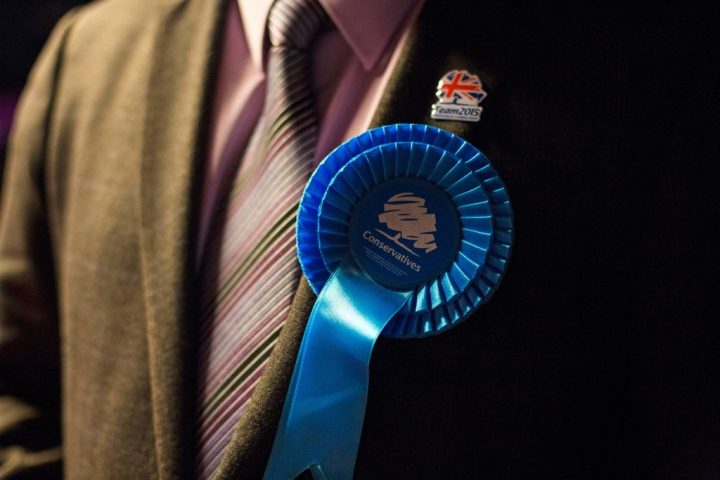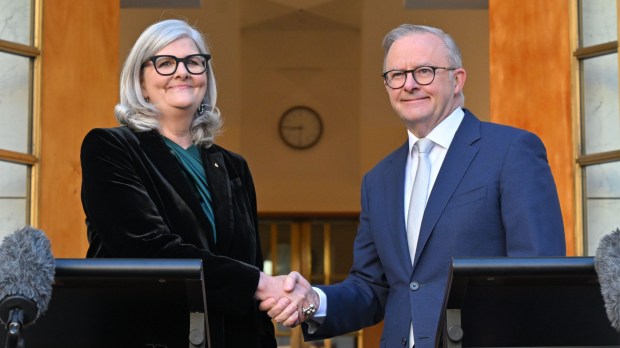It’s probably never been cool to be a Tory. There will never be a Conservative youthquake – they are the unhip party, the unkissed party. Voting Conservative has always been a mark of being a bit older, a bit more settled down. Like a sensible saloon car and comfortable shoes, it was something you eased into when you acknowledged you were past the flush of youth. Now, however, the party is seemingly losing even that.
New polling from Portland Communications shows the Conservative party is losing sway with the least cool demographic of all: middle-aged dads. On almost every metric, the party is in retreat, with its vote share among the normally solid blue 50-59-year-olds dropping by a precipitous 27 points since 2019. This will probably be enough to wipe them out in the key suburban seats which could mean the difference between a slender Labour majority next time round and annihilation for the Tories.
It can’t be trusted that a few more laps around the sun simply turns you into a Tory
Some of this is of course down to the chaotic course the government has taken in the last year or so. It’s been beleaguered by scandals and beset by the challenge of a stuttering economy and public services. It has also failed to meet these issues with convincing policies, seemingly opting for a managed decline of both itself and the country. The government now feels like it’s working out its notice, turning up but doing little more than going through the motions. Yet the Tories’ problems are not simply short-term.
While not as strained by housing and childcare costs as the Millennials and Zoomers, those in their forties and fifties have not enjoyed the demographic dividends their parents did. Many will own property but will be paying more for less than their parents did. They will be exposed to rising mortgage costs and will have had the hit of childcare already. The richest may be baulking at the big real terms costs in private schools, or be straining at helping their children fly the nest. The poorest will be headed towards a hugely insecure retirement.
These voters are becoming economically estranged from the Tories, worrying far less about tax than they are about rising prices and falling public services. Those in middle age come into contact with the state far more than many younger voters. They worry about funding (and strikes) in their children’s schools, or that the NHS might not be there, either for their ailments, or their parents. Even if they believe in a lean state, they want it to work.
They are also more culturally liberal than their forebears. Less than half are Brexiteers, and their patriotism is less entrenched than the pensioners. On a host of cultural issues, they are closer to their children than their parents. This makes them unreceptive to Tory attempts to use culture as a wedge issue, and indeed can turn them off the party entirely. They tend to be conscientious objectors in the culture wars.
Losing this group presents a major problem for the Conservatives. While the grey vote still appears ready to turn out for them, it is not enough to win an election. The Tory party has always relied on the middle-aged, those with a bit of wealth and in their prime earning years, to keep them in office. They provide the safe seats in the suburbs, encircling the Labour leaning cities and making up a big chunk of swing seats.
More than that, the middle-aged are the older voters of tomorrow. The generational shuffle cannot be avoided, but nor can it be trusted that a few more laps around the sun simply turns you into a Tory. Voting motivation is a complex matter of economics, culture, and aesthetics – but if you are losing on all three it is hard to reverse it. If the Tories cannot find both the policies and presentation to reverse this shift, in a decade or two they will be behind with every single demographic. That’s political oblivion.
The Spotify dads of today are quite unlike the middle-aged men of yesteryear. It’s not just their band T-shirts and battered Converse trainers that speaks to this, but so too their cultural attitudes and economic position. They are perhaps less prosperous and certainly more liberal than their parents were at this age. They are also far less likely to vote Conservative.
The party has the chance to make this a blip, and accept a bad run out in 2024 after nearly a decade and a half in power, before coming back intellectually reinvigorated. But that will take effort and energy, it can’t be left to a vague hope that ageing makes you Tory. It will also involve tackling the party’s increasing deficit among women voters, a bloc which has turned from its secret strength to its biggest weakness. But if the party cannot convince the relatively well-off and aching unchic to vote for them, it’s hard to see what hope it has.
Got something to add? Join the discussion and comment below.
Get 10 issues for just $10
Subscribe to The Spectator Australia today for the next 10 magazine issues, plus full online access, for just $10.




















Comments
Don't miss out
Join the conversation with other Spectator Australia readers. Subscribe to leave a comment.
SUBSCRIBEAlready a subscriber? Log in